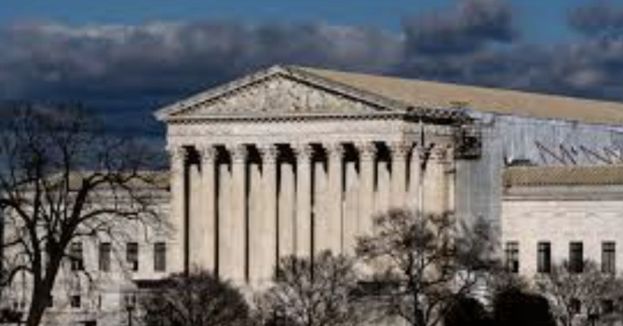The Supreme Court's decision came after a whirlwind 24 hours of legal back-and-forths, as reported by CBS News. The court initially allowed a stay on enforcement of SB4 to lapse, only to reinstate it within an hour, and then finally lift it again, this time seemingly for good.
The Supreme Court's decision on Tuesday greenlights Texas officials to jail and prosecute migrants suspected of unauthorized entry into the U.S. via the southern border. This controversial law, one of Governor Greg Abbott's signature immigration policies, has been labeled unconstitutional by the Biden administration. However, the high court denied a request from the Justice Department to halt the law's enforcement while the U.S. Court of Appeals for the 5th Circuit considers its legality.
WATCH: BRITISH COLONEL RICHARD KEMP REPORTING FROM GAZA![]()
The legal intricacies of this case are complex. The Fifth Circuit initially accepted an appeal of a lower-court ruling that rejected SB4 as an unconstitutional infringement of the Supremacy Clause. They then stayed their own ruling while the Biden administration appealed to the Supreme Court. The Supreme Court extended the stay while it considered the emergency request to vacate the stay. However, this temporary stay expired, only to have Justice Samuel Alito issue a new stay.
WATCH: NO CLUE WHY THEY ARE PROTESTING: "I WISH I WAS MORE EDUCATED"![]()
Despite the confusion, the situation now appears more straightforward. The lower court ruling has been enjoined while the Fifth Circuit reviews Texas' appeal. This injunction strongly suggests that the appellate court will rule in Texas' favor. The apparent 6-3 ruling from the Supreme Court also suggests that it will look favorably on the matter. Courts typically do not issue injunctions unless the party is likely to prevail at trial and substantial harms will occur without an injunction. Given that Texas seems to have convinced both courts of the necessity of the injunction against the lower court ruling and now have permission to enforce this law, it seems the two courts see Texas as the likely victor in this legal battle.
TIKTOK'S DOOMSDAY CLOCK IS TICKING: HOW WILL THIS AFFECT ITS 170 MILLION AMERICAN USERS?![]()
March 20, 2024
The court's decision to allow SB4 to proceed was based heavily on potential harms. Justice Amy Coney Barrett wrote a concurrence, stating that the choice to issue an administrative stay reflects a first-blush judgment about the relative consequences of staying the lower court judgment versus allowing it to go into effect. Texas argues that the District Court’s injunction of SB4 prevents it from addressing an escalating crisis at the border, while the United States argues that SB4 undermines foreign relations and injures its sovereign interest in enforcing federal law.
WATCH: ILHAN OMAR WARMLY WELCOMES SUSPENDED DAUGHTER AT COLUMBIA'S ANTI-SEMITIC ENCAMPMENT![]()
However, Barrett sees this more as a procedural error on the part of the Biden administration and the Fifth Circuit. She suggests that the Fifth Circuit should be the first mover and apply the Nken factors and decide the motion for a stay pending appeal. If a decision does not issue soon, the applicants may return to the Supreme Court.
CRITICS SLAM BIDEN'S ATTEMPT TO RELATE PERSONAL TRAGEDY TO POLICE OFFICER DEATHS![]()
The three liberal justices combined into two written dissents. Justices Sonia Sotomayor and Ketanji Brown Jackson were prepared to rule on behalf of the Biden administration, stating that the court invites further chaos and crisis in immigration enforcement. They argue that Texas' law upends the federal-state balance of power that has existed for over a century, in which the National Government has had exclusive authority over entry and removal of noncitizens.
NYU ENCAMPMENT ORGANIZERS PUSH PROTESTERS TO JOIN THIS PRO-HAMAS NETWORK![]()
Justice Elena Kagan, on the other hand, objected to the procedural grounds used by the majority. She believes that the applicants satisfy the four-factor test set out in Nken v. Holder, governing when a stay pending appeal is appropriate. Given the long-standing understanding that immigration is the special province of the Federal Government, she would not allow Texas Senate Bill 4 to go into effect.
PANDAS OVER PEOPLE? SF MAYOR'S CONTROVERSIAL CHINA TRIP SPARKS OUTRAGE![]()
It is surprising that both courts allowed the law to go into effect. Sotomayor and Jackson have precedent on their side; the courts have ruled in the past that the Supremacy Clause gives the federal government jurisdiction on immigration policy. However, Texas will argue that states can pass laws that mirror federal laws and that both sovereigns can enforce their own laws as they see fit.
FROM DISGRACE TO REDEMPTION: DAN RATHER TO MAKE UNEXPECTED RETURN TO CBS![]()
The six conservative justices will have to consider the merits rather than the process if the Fifth Circuit agrees to that. But if those justices didn't already think that the merits favored Texas, they would have overlooked the procedural issues and kept the law from coming into force.
BIDEN'S ICE ACCUSED OF COVERING UP ILLEGALS' CRIMINAL IDENTITIES, BUT WHY?![]()
As the legal battle continues, the public will have to stay tuned for further developments. The enforcement of SB4 marks a significant shift in immigration policy and could have far-reaching implications for the balance of power between state and federal governments.








 Discover alternative ideas that will make you think
Discover alternative ideas that will make you think Engage in mind bending debate
Engage in mind bending debate Earn points, rise in rank, have fun
Earn points, rise in rank, have fun


